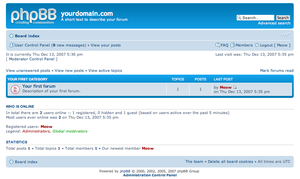
Image via Wikipedia
Flaming in the net occurs when someone attacked the person, insulted him personally, or criticized the person who authored the article. However, if someone has criticized the ideas injected by the author in his article, it’s not flaming and it is normal.
For the past ten years being a member to some Internet forum groups, I had noticed that flaming or bashing between members is happening. Some of the members are posting deliberately hostile messages without the awareness of other people’s feelings. Now many of forum groups owners and its moderators have agreed and work together to apply some forum rules and policies to be followed by its members. And who ever ignored its rules will be banned from accessing the forum. Some would be banned for few days, weeks, a month or would be kicked off from the forum permanently.
The reason why I liked forum groups is that I can share my articles which are open for critiques. Some of the members are sharing their honest suggestions how to improve my articles. But there are times I received comments not actually criticizing the idea I injected to my works but directly insulting my personality or my credibility as the author. However, I just ignored them and thought that maybe they missed to read the forum rules.
Speaking of forum rules and policies – I noticed that they are common to all of forum groups and other e-groups I have gone through such as:
- Members are not allowed to post defamatory, obscene, threatening, profane and hateful messages. The Admin or Moderators will ban members or offending posters.
- Commenting may include grammar correction. It may also focus on form and technicalities. Members should take all these constructively.
- All criticisms should be taken constructively believing that there are no good or bad articles and no wrong or right comments. The important thing is that, if the author wished to send his articles to other publishing sites at least they are already polished.
- Members should justify their criticisms too, explaining their reasons when they note an article’s weaknesses. As much as possible, members should make suggestions on how to improve the article instead of just pointing out its weaknesses.
- Members should avoid criticisms which may only offend but do not help the author in improving the article. Example: “This article is rubbish.”
- Comments which taunt, show contempt, disrespect or personally attack the author are not allowed. Members who make such comments will be penalized accordingly.
- Discussions or debates like social issues and current events are allowed but should be done with respect among concerned members. Personal arguments among members are not tolerated and are subject to disciplinary action.
Members are also advice to take note the following:
- When someone makes a mistake – whether it’s a spelling error or a spelling flame, a stupid question or an unnecessarily long answer – be kind about it.
- If it’s a minor error, you may not need to say anything. Even if you feel strongly about it, think twice before reacting. Having good manners yourself doesn’t give you license to correct everyone else.
- If you do decide to inform someone of a mistake, point it out politely and preferably by private email rather than in public.
- Give people the benefit of the doubt; assume they just don’t know any better. And never be arrogant or self-righteous about it.
- Just as it’s a law of nature that spelling flames always contain spelling errors, notes pointing out Netiquette violations are often examples of poor Netiquette.
According to Wikipedia Flaming also known as bashing, is hostile and insulting interaction between Internet users. Flaming usually occurs in the social context of an Internet forum, Internet Relay Chat, Usenet, by e-mail, game servers such as Xbox Live or Play station Network, and on video-sharing websites. It is frequently the result of the discussion of heated real-world issues such as politics, religion, and philosophy, or of issues that polarize sub-populations, but can also be provoked by seemingly trivial differences.
If flaming could not be avoided between members, my best and only suggestion is “Say Sorry” because I believe it is the best oil that lubricates any relationships!


No comments:
Post a Comment